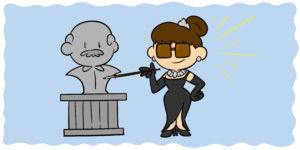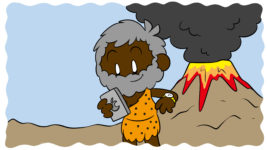Ian McEwan published his first novel in the late 1970s, but it wasn’t until the late eighties that he began to sneak into the spotlight, with his 1987 novel The Child in Time winning a Whitbread Award and his 1998 novel Amsterdam winning the Man Booker. Then, in 2001, he blew everyone’s minds with Atonement, his most widely known and successful novel.
A remarkably prolific writer despite his professed tendency to work slowly and his proneness to ‘hesitation,’ McEwan has remained one of Britain’s best-known novelists and continues to churn out critically successful books. Known for his tight, considered prose and his breadth of topics and genres, McEwan undoubtedly has a lot of wisdom to share with less experienced writers. Sadly, he’s ostensibly not too keen on sharing:
I often think that I don’t really have any advice to give at all, and that everyone should find their own way, but that never really satisfies anyone.
– Ian McEwan
You’re darn right it doesn’t, McEwan! Thankfully, McEwan has in fact shared some thoughts about overcoming the struggles writers often face when trying to get their work on paper. Here are five of the best.
1. Read
A literary man through and through, McEwan is of the camp that insists that if you don’t read, you can’t expect to write. I tend to agree; thinking you can write without being an avid reader is like thinking you can be a musician without ever listening to music or a chef without ever eating food.
Reading is vital for any author; without it, we don’t absorb the words of others, we don’t get a sense of how style and voice work, we don’t internalize the ways in which stories are structured and relayed. McEwan feels this keenly and always tries to leave several hours per day for reading:
The afternoons I try to leave for reading – and again, I try to take reading seriously, and so between maybe two and four o’clock [I won’t] answer the phone – because I’m reading!
– Ian McEwan
It’s eye-opening to see an author as experienced and celebrated as McEwan – he has, remember, sixteen novels under his belt, as well as several short story collections, screenplays, children’s books, plays, and even operas – so explicitly name reading as something vital to his craft. And if it’s this important for Ian McEwan, you’d better believe it’s important for you too!
2. Take it seriously
McEwan joins just about every successful writer ever in swinging at the popular myth of the writer as a romantic, inspired genius. The truth, he says, is far less glamorous – being a writer involves turning up each day and working even if you don’t want to.
Routine, then, is vital. This is a truth acknowledged by writers from John Steinbeck to Toni Morrison, and it’s sadly true that the road to writerly disappointment is paved by those who didn’t structure their workdays.
‘It’s very important to turn up at this desk,’ McEwan says, referring to his own gigantic worktable, ‘whether you feel like it or not, whether you have any ideas or not.’ Inspiration doesn’t matter; it’s about consistency and putting in the hours. ‘You’ve got to have the work ethic.’
And don’t think for a moment that ‘turning up’ is all that matters – no, you can’t then watch YouTube videos or browse your emails. Echoing Jonathan Franzen and Zadie Smith, McEwan declares, ‘It’s very important to close off all those avenues to the outside world, like the internet, email, the telephone.’ Sorry – there’s room only for you and your work.
3. Keep a journal
McEwan is known for his carefully considered and wonderfully observed realist fiction (best exhibited in, for example, Black Dogs and On Chesil Beach), and he credits his lifelong habit of keeping a journal with helping craft that delicate style.
For McEwan, capturing reality in a compelling and satisfying way comes down to recognizing the significance of the everyday, of the little banalities that make up human living. Unlike Joan Didion, a literary journal-keeper who had little time for historic record-keeping, McEwan considers his journals most valuable when they provide records of such mundane observations and activities.
What fascinates me most about what was going on in my life thirty years ago are the things that we would consider the most mundane – what was I reading, who was I talking to, what were the main subjects of conversation; where were you living, what was on your desk, who did you love?
– Ian McEwan
These seemingly mundane facts, McEwan suggests, tell stories; they’re the little humanizing details that are too often forgotten in fiction, which tends to focus on grand narrative more than the quiet reality of human existence.
This is an easy tip to implement; simply start writing about your life when you get the chance. You could do this McEwan’s way and keep a record of your life’s details, or you could follow Joan Didion and blur fact with fiction, or else note down only strange, contextless notes which quickly lose their original significance but which gain strange new meanings as time passes. Whichever path you choose, don’t feel like you have to write in your new journal every day – once a week is enough, McEwan suggests, or just whenever you feel like it.
4. Start small and build up
So, you’ve decided you want to be a writer. Good stuff, McEwan says, now ‘put your toe in the water gently.’ This is, oddly, a rather unusual piece of advice to hear from a famous writer (though it’s very common among creative writing tutors); many famous writers, after all, found success by sticking to a single form and have never spent much time thinking about other forms. American novelist Cormac McCarthy goes so far as to actively denigrate all forms of fiction that aren’t novels, claiming he has no time for ideas and stories that can be communicated in anything shorter than a novel.
McEwan, however, has no such high-and-mighty qualms. He, like hundreds of other writers out there, started on short stories, which, while they’re very difficult to do well, don’t require as much time to complete as novels. Additionally, they allow you to experiment – you can try different voices, styles, and genres, and are free to fail every now and then without dooming a much larger project and thus wasting a whole lot more time. Short stories, as McEwan says, are ‘a wonderful laboratory.’
Once you’re getting the swing of things and have produced a few short stories, McEwan poses the next logical step: a novella. He suggests taking whichever of your short stories still nags at you, as if there’s more to explore there or more questions to answer, and working on fleshing it out. This could take a ‘delirious month,’ it could take six months, it could take a year, but by the end of it you’ll have a novella and, more importantly, you’ll have learned a ton about structure, form, and pace.
5. Take your time
Many writers follow in Stephen King’s footsteps and try to get their nascent ideas down as quickly as they can. Splurge the first draft, the reasoning goes, and you’ll have plenty of time to edit and redraft later on.
Now, there’s nothing wrong with this approach, but it’s certainly not Ian McEwan’s. No; McEwan hesitates, he mulls, he takes his sweet time – and for good reason.
I’m a slow starter when it comes to novels. What can seem like a good idea on a Monday can be much less of good idea in two months’ time.
– Ian McEwan, ‘Q&A with Ian McEwan: The art of writing, the writer’s life’ from The Philadelphia Inquirer
Evidently, McEwan is a man who hates wasting time and effort. He’d rather sit on an idea for a couple of months than rush into it only to find out that it was a non-starter all along. But this slow, contemplative approach has its benefits: if you take your time, you slow down enough to really consider your sentences, your syntax, and the words you’re using.
David Foster Wallace, a very different writer, did the same thing; he wrote in longhand to slow down the pace at which he was able to write and kept a thesaurus and a usage dictionary with him whenever he was writing, as he thought that speed was detrimental to good writing. Like McEwan, he believed that good things take time.
The reluctant Mr. McEwan
So there it is. For a writer who believes firmly that every budding author needs to find their own way, McEwan has been remarkably vocal regarding both his own working routine and advice for others. And, frankly, it’s just as well – McEwan’s won dozens of awards, taught briefly at the prestigious Iowa Writers’ Workshop, and has managed to secure the kinds of wealth and prestige most writers can only dream of. His advice is worth its weight in book deals!
So, if you’ve been treating writing like a hobby, maybe it’s time to get serious: stick to a schedule, read good books religiously, and slow down, particularly if you’ve previously been an adherent of King-esque splurging. You may be surprised by the insight a change of pace can provide!
What are your favorite books by Ian McEwan? How has he influenced your own writing? Let me know in the comments, and check out 7 Ways Donald E. Westlake (And Richard Stark) Can Help You Improve Your Writing and 5 Things Jennifer Egan Can Teach You About Writing for more advice from literary greats.





